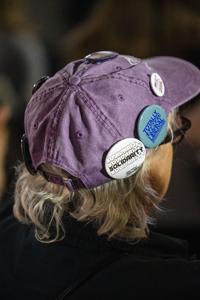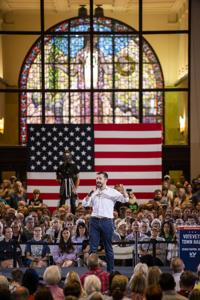
A person with buttons on their hat listens as Pete Buttigieg speaks at a town hall hosted by VoteVets at the Veteran’s Memorial Building in Cedar Rapids, Iowa on Tuesday, May 13, 2025.
KC McGinnis/Washington Post
CEDAR RAPIDS, Iowa – Pete Buttigieg said President Joe Biden’s decision to seek a second term “maybe” hurt Democrats and that “with the benefit of hindsight, I think most people would agree that that’s the case.”
But Biden’s former transportation secretary also tried to turn the page Tuesday night as he makes moves toward another presidential run in 2028, saying his party is “not in a position to wallow in hindsight” and using a packed town hall here to warn against counting on backlash to President Donald Trump in future elections.
“There’s this theory out there that if we just kind of hang back, don’t do much, then the people in charge today will screw it up, and then they’ll get blamed for it, then we’ll win,” Buttigieg said Tuesday night. “I disagree.” The audience cheered.
The town hall showcased Buttigieg’s vision for rebuilding the Democratic Party, hours after he suggested to an independent journalist that he would look at running in 2028. It also offered a glimpse of some potential challenges, including how he talks about his ex-boss Biden, who many in the party are still angry with over his decision to seek a second term.
Iowa is no longer Democrats’ first-in-the-nation caucus state where presidential campaigns are supercharged or deflated. But few think it is a coincidence that Buttigieg made his highest-profile public appearance since leaving government in the politically symbolic place where he pulled off an unlikely victory in 2020.
The last time he was in Cedar Rapids, Buttigieg said at the town hall, he was working to “fix up” the local airport. “And last time I was here before that, I was sort of -” he paused – “winning the Iowa caucus.”


CEDAR RAPIDS, IA – MAY 13, 2025: Pete Buttigieg speaks at a town hall hosted by VoteVets at the Veteran’s Memorial Building in Cedar Rapids, Iowa on Tuesday, May 13, 2025.
KC McGinnis/Washington Post
Back then, in 2020, Buttigieg was the 38-year-old, openly gay mayor of South Bend, Indiana – a surprising standout in a Democratic primary field stocked with senators, billionaires and Biden. He raised his profile with a go-everywhere media strategy, narrowly beating Sen. Bernie Sanders (I-Vermont) in the glitch-plagued Iowa caucuses before struggling in other early primary states and eventually throwing his support behind Biden.
Now, after four years as Biden’s transportation secretary, Buttigieg is one of the most prominent politicians in a Democratic Party searching for leaders. Heading to Iowa this week, he dropped by a happy hour with some of the volunteers and staff from his 2020 campaign before joining the town hall hosted by a liberal veterans group, where he appealed heavily to the audience’s sense of patriotism and talked about teaching his young children about the values behind the American flag.
He laid out a case against Trump, saying that “the American people bow to no king” and mocking one of Trump’s Cabinet members for referring to AI as “A1.” He wondered what the late civil rights activist and Democratic lawmaker John Lewis “would think of this moment,” saying “it would not come as novel to him that there’s a side of America that’s capable of political violence and illegal behavior by people in positions of power” and expressing optimism that the country can push back, as it has before.
He defended Biden to reporters when asked if the former president experienced “cognitive decline” in office, saying that “every time I needed something from him, from the West Wing I got it.” But he also told the crowd that Democrats “do not have the best brand around here” and need to convey “what we are determined to build,” not just what “we are trying to block.”
Buttigieg said that what Democrats stand for should rest on the principles of “freedom, security and democracy, correctly understood.” He got some of his loudest applause, and a standing ovation, when he said that includes women’s “right to choose,” underscoring the issue’s lasting potency for Democrats.
With 2028 still far away, it remains to be seen whether he has addressed his biggest vulnerabilities from the 2020 primaries: namely, his struggle to win over the Black voters at the core of the Democratic base. Bakari Sellers, a former Democratic state lawmaker in early-voting South Carolina – where Buttigieg placed fourth in 2020 before dropping out – said it’s “premature” to say whether Buttigieg has dispelled his challenges with Black voters.
“He’ll be on my list to consider, certainly,” said Sellers, who credited the former transportation secretary for his ability to “go in any setting.”
Potential presidential candidates are traveling the country to offer their thoughts on the party’s path forward. Buttigieg has been advocating the strategy that brought him out of obscurity, urging Democrats to communicate through a wider range of media and break out of liberal bubbles.
It’s a message many are receptive to after a disappointing election in which Trump made savvy use of the podcast “manosphere” and shaped politics through culture.
“To me the thing we’re not talking about enough – while we talk about what we have to say, and how we have to say it – is where we say it,” Buttigieg said at a February panel discussion at the University of Chicago.
“We need to be prepared to go everywhere, and that’s always been my style,” he echoed last month on an episode of the “Flagrant” comedy podcast, which hosted Trump last fall.
Buttigieg’s couch sit-down with the “Flagrant” crew embodied the “go everywhere” pitch. For nearly three hours, he chatted with the hosts about Trump’s tariffs, his coming-out story and the TV show “White Lotus.”
One of the hosts, Akaash Singh, said he viewed Trump’s tariffs as a way to remedy “decay” in “middle America” and said of Democrats, “it doesn’t feel like the party that I want to identify with has any empathy for them.”
“Yeah, I think that’s really important,” Buttigieg said. “And I think what my party has to do is respond to this in a way that doesn’t make it sound like our whole argument is, let’s just go back to 2024, right? Things like this, moments like this, movements like the one that’s in charge of the White House right now don’t spring up in a country or an economy where everything’s going along fine.”
Other Democratic leaders and potential 2028 candidates have also been looking beyond traditional and liberal media. California Gov. Gavin Newsom has been courting MAGA influencers in recent months, inviting GOP activists Charlie Kirk and Stephen K. Bannon onto his podcast for cordial discussions. Rep. Ro Khanna (D-California), an ambitious congressman, has ramped up his ventures into pro-Trump media, at one point spending two hours live-streaming as the guest of a YouTuber who has called the Jan. 6, 2021, attack on the U.S. Capitol an “inside job.”
But Sean Bagniewski, an Iowa state legislator who chaired the Polk County Democratic Party during the 2020 election cycle, said Buttigieg comes up most often in conversations with fellow Democrats as a model for how to communicate outside their comfort zone.
“I think the rest of the Democratic Party is finally starting to see that he was on to something,” Bagniewski said.
“Pete wrote the playbook on going everywhere in media,” said Lis Smith, a senior adviser on Buttigieg’s 2020 campaign. “It’s great that other Democrats are catching up to it, but he was talking to completely nonpolitical audiences, going to red areas, and appearing on right-leaning, right-coded, and flat-out right-wing media before it was fashionable.”
Buttigieg first stoked speculation about another presidential run this year when he passed on running for the governorship or an open Senate seat in Michigan – where his husband grew up and where Buttigieg now lives.
“When people show up in Iowa, New Hampshire and South Carolina it generally means they are seriously considering running for president,” said Steve Elmendorf, a lobbyist and longtime Democratic political adviser who supported Buttigieg in the 2020 primaries.
In 2020, Buttigieg did well in mostly-White Iowa and New Hampshire but then fell behind in Nevada and South Carolina, which have far more voters of color. If he runs again, his biggest challenge could be showing that he can build a diverse coalition.
Buttigieg made race a focus as transportation secretary, talking about the “racism physically built into some of our highways” through decisions that harmed Black communities and launching a $1 billion pilot program to address the issue.


Pete Buttigieg greets people during a town hall hosted by VoteVets at the Veteran’s Memorial Building in Cedar Rapids, Iowa on Tuesday, May 13, 2025.
KC McGinnis/Washington Post


Liz McDermott of LeClaire, Iowa listens as Pete Buttigieg speaks at a town hall hosted by VoteVets at the Veteran’s Memorial Building in Cedar Rapids, Iowa on Tuesday, May 13, 2025.
KC McGinnis/Washington Post
But Sellers, the former South Carolina lawmaker, said candidates’ forward-looking pitch will be what matters. “We’re not electing somebody based upon their record as transportation secretary,” he said. “You’ll be electing somebody based upon the future and tomorrow.”
Iowans began lining up more than an hour before doors were scheduled to open at the Veterans Memorial Building where Buttigieg spoke. Many were Buttigieg supporters in 2020; others didn’t vote for him but were curious to hear what he had to say and eager for some outlet to vent about the Trump administration. The room was full; event host VoteVets, which supports Democratic veterans running for office, estimated about 1,800 people in attendance.
Buttigieg lingered for an hour after leaving the stage, greeting voters and posing for photos before taking brief questions from reporters.
John O’Bryon, a retired pastor, wore a “2020 Pete Buttigieg” shirt with the last digit hand-tweaked to read “2028.”
“Please, God,” he said, hands briefly clasped in front of him.
His wife, 67-year-old Bobbie O’Bryon, signed up to help Buttigieg’s 2020 campaign after seeing him on TV. At that point, John O’Bryon said, people thought, “who is this guy? Who does he think he is that he can run for the nomination?” No longer.
“He’s got the guts to go on Fox News, to go into the manosphere, to go into these places,” O’Bryon gushed. “And he’s so smart, and he’s just – you can’t stump him.”















